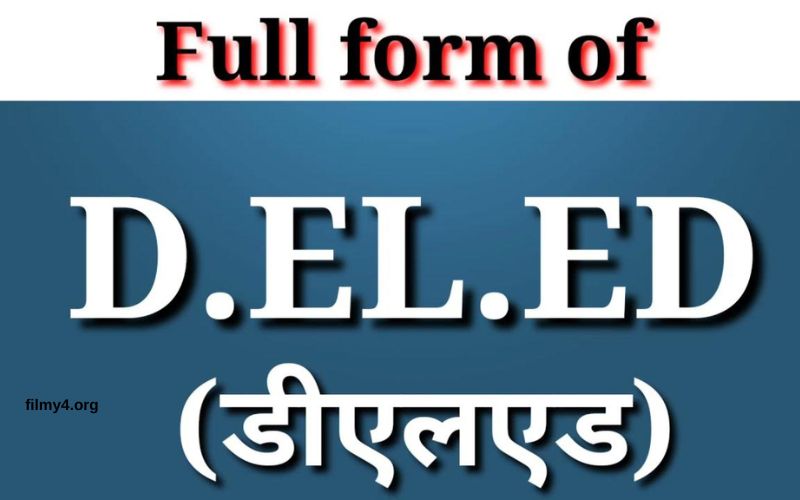D El Ed stands for “Diploma in Elementary Education,” a two-year teacher training program designed to prepare educators for teaching at the elementary level. This course is crucial for those aspiring to build a career in teaching young children. In Hindi, D.El.Ed is expressed as “प्राथमिक शिक्षा में डिप्लोमा.” This article delves into the full form of D.El.Ed, its significance, structure, and the prospects it offers to aspiring teachers in the context of the Indian education system.
The Importance of D.El.Ed
Education is the cornerstone of development in any society, and the quality of elementary education lays the foundation for a child’s future learning and development. The D.El.Ed program is instrumental in equipping future educators with the necessary skills and knowledge to foster a conducive learning environment for young students. In Hindi, the importance of primary education can be encapsulated as “प्राथमिक शिक्षा की गुणवत्ता ही किसी समाज की प्रगति का आधार होती है।”
Structure of the D.El.Ed Program
The D.El.Ed program is structured to provide comprehensive training to aspiring teachers. It encompasses a range of subjects and practical experiences aimed at developing pedagogical skills, understanding child psychology, and effective classroom management. Here is a detailed look at the components of the D.El.Ed curriculum:
- Core Subjects: The curriculum includes core subjects such as Hindi (हिंदी), English (अंग्रेज़ी), Mathematics (गणित), Environmental Studies (पर्यावरण अध्ययन), and Social Science (सामाजिक विज्ञान). These subjects are designed to ensure that teachers have a strong grasp of the content they will teach.
- Pedagogy: Pedagogy or the method and practice of teaching is a crucial part of the D.El.Ed program. It covers various teaching methodologies, lesson planning, assessment techniques, and classroom management strategies. In Hindi, pedagogy is referred to as “शिक्षण विधि.”
- Child Development and Psychology: Understanding the developmental stages and psychological needs of children is essential for effective teaching. This component of the program focuses on child development theories, learning styles, and behavioral management.
- Practical Training: Practical training or “व्यावहारिक प्रशिक्षण” is a significant part of the D.El.Ed program. It includes internships, teaching practice sessions, and classroom observations, enabling students to gain hands-on experience in real classroom settings.
- Educational Technology: With the advent of digital learning, incorporating technology in education has become imperative. The program includes training on how to use educational technology effectively in the classroom.
Admission Criteria and Eligibility
To enroll in the D.El.Ed program, candidates must meet specific eligibility criteria. Generally, the following requirements must be fulfilled:
- Educational Qualification: Candidates must have completed their higher secondary education (12th grade) with a minimum aggregate score of 50%. In Hindi, higher secondary education is referred to as “उच्च माध्यमिक शिक्षा.”
- Entrance Examinations: Some states and institutions conduct entrance examinations to select candidates for the D.El.Ed program. These exams assess the candidate’s knowledge and aptitude for teaching.
- Age Limit: The age limit for admission to the D.El.Ed program varies between institutions, but it typically ranges from 18 to 35 years.
Career Prospects and Opportunities
Upon completing the D.El.Ed program, graduates can pursue various career opportunities in the field of education. The primary career path is to become an elementary school teacher, also known as “प्राथमिक विद्यालय शिक्षक” in Hindi. However, there are other avenues as well:
- Government and Private Schools: D.El.Ed graduates can find employment in both government and private schools. Government schools often provide job security, while private schools may offer competitive salaries.
- Educational Administration: Some graduates may choose to work in educational administration, overseeing school operations and ensuring adherence to educational standards.
- Further Studies: Graduates can opt for further studies, such as a Bachelor of Education (B.Ed) degree, to enhance their qualifications and open up higher-level teaching positions.
- Tutoring and Coaching: With the rise of private tuitions and coaching centers, D.El.Ed graduates can also venture into private tutoring, providing personalized education to students.
The Role of D.El.Ed in the Indian Education System
The D.El.Ed program plays a pivotal role in the Indian education system by ensuring that teachers are well-prepared to impart quality education at the foundational level. In Hindi, this can be expressed as “भारतीय शिक्षा प्रणाली में डी.एल.एड. कार्यक्रम की महत्वपूर्ण भूमिका है।”
- Quality Education: Trained teachers contribute to improving the quality of education, thereby enhancing student learning outcomes and overall academic performance.
- Inclusive Education: The program emphasizes inclusive education, ensuring that teachers are equipped to handle diverse classrooms with students from various backgrounds and learning abilities.
- Continuous Professional Development: The D.El.Ed program encourages continuous professional development, enabling teachers to stay updated with the latest educational practices and methodologies.
- Community Impact: By producing competent teachers, the D.El.Ed program indirectly contributes to the development of communities, as educated individuals are better equipped to contribute positively to society.
Conclusion
The D.El.Ed program, or “प्राथमिक शिक्षा में डिप्लोमा,” is a critical stepping stone for those aspiring to enter the teaching profession at the elementary level. It provides comprehensive training in pedagogy, child development, and practical teaching experience, ensuring that graduates are well-prepared to make a significant impact in the field of education. As India continues to prioritize education as a means of development, the role of well-trained elementary educators becomes increasingly vital. The D.El.Ed program stands as a testament to the country’s commitment to nurturing the educators who will shape the future of young learners.













